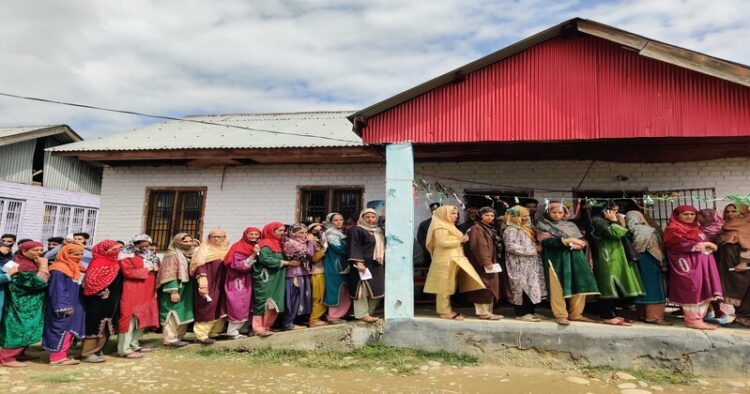At the gates of polling centres in Pulwama, a South Kashmir district infamous for terrorism and stone-pelting, enthusiastic voters queued up on May 13 to exercise their franchise with a sense of ease, as there was no separatist-sponsored boycott call and fear of violence.
“We have had enough. We want change. Vote is our biggest weapon. It is a powerful weapon which will help us find solutions to our problems. Vote is our right,” Shakeel Ahmad Para, a voter at a polling booth here, said.
Polling in Jammu and Kashmir’s Srinagar Lok Sabha constituency is being held in the fourth round of the seven-phase Lok Sabha elections.
This is the first major election in Kashmir after the abrogation of Article 370, which granted special status to the erstwhile state of Jammu and Kashmir. The article was revoked in 2019, leading to the bifurcation of the state into Union Territories of Jammu and Kashmir and Ladakh.
Elections in Pulwama mark a real referendum—a rejection of separatist ideology and a celebration of democracy. Pulwama, once a hub of radicalism, has embraced the idea of India, shunning boycotts and separatist elements.
Previously known for boycotting polls, Pulwama has now made headlines for its enthusiastic participation in the festival of democracy. Today’s elections are a slap in the face to those who once boasted of “freedom perfume” from the land. To those separatist elements who once incited violence by claiming the “fragrance of freedom” comes from Pulwama’s soil, it’s worth noting that today, “the fragrance of democracy and the idea of India emanates from Pulwama and Shopian Soil” where ballots triumphed over bullets.
This election saw a remarkable turnout, with around 41 percent of votes polled—the highest since 1987 in the valley. Villages like Lelhar, Kakapora, Karimabad, Muchpuna, Panzgam, and others voted for the first time since 1987. Lelhar and Kakapora, the areas where a mastermind of the Pulwama 2019 attack hailed, saw around 900 votes each. These villages had never voted before. Karimabad and Muchpuna, too, never voted before, recorded 911 and 375 votes, respectively. Pulwama’s transformation from the bullet to the ballot box is commendable.
For the first time since 1987, a high percentage of voting was witnessed, marking a significant shift from separatism to a belief in democracy and the idea of India. Even leaders like Gh Qadir Wani, the head of Jamaat-e-Islami Jammu and Kashmir, who was the architect of poll boycotts in the past, cast their votes for the first time since 1987.
The transformation post-370 is remarkable. Former separatist elements are now actively promoting the idea of India and embracing its principles. It marks the highest level of transformation observed, with the youth now showing unprecedented belief in the idea of India following the abrogation of Article 370.
Pulwama’s journey from boycotts to ballots is a testament to the power of democracy and the resilience of its people. It serves as an eye-opener for the world, highlighting how democracy thrives in India while the opposite is true in POK, where violence dominates the narrative. Pulwama’s transformation stands as a beacon of hope for democracy worldwide.



















Comments